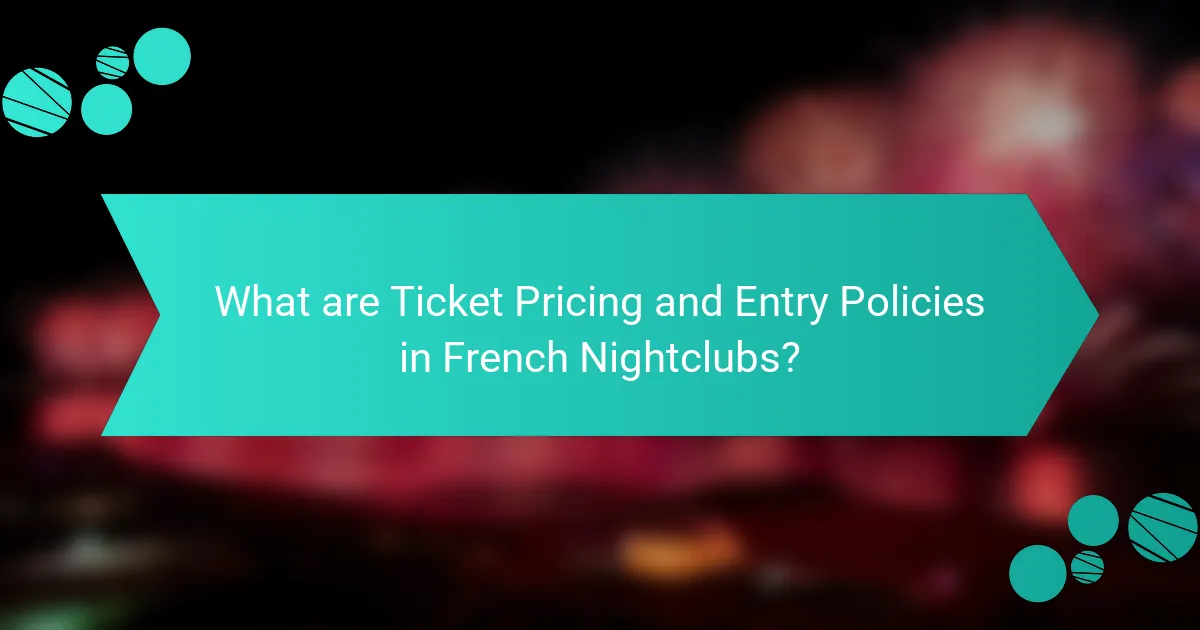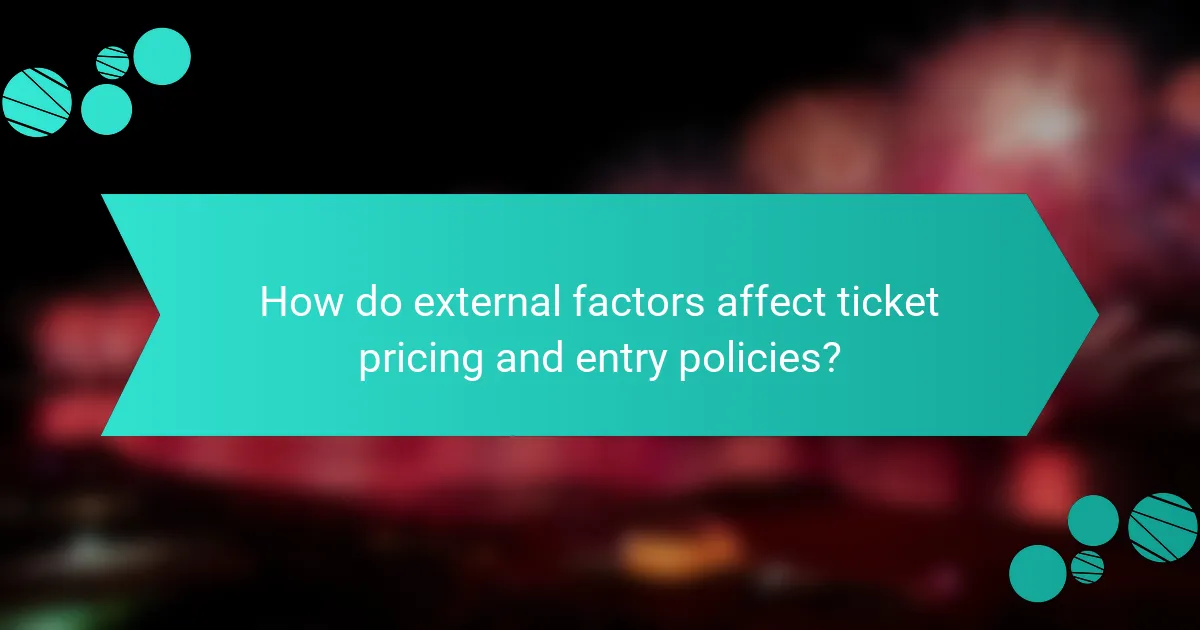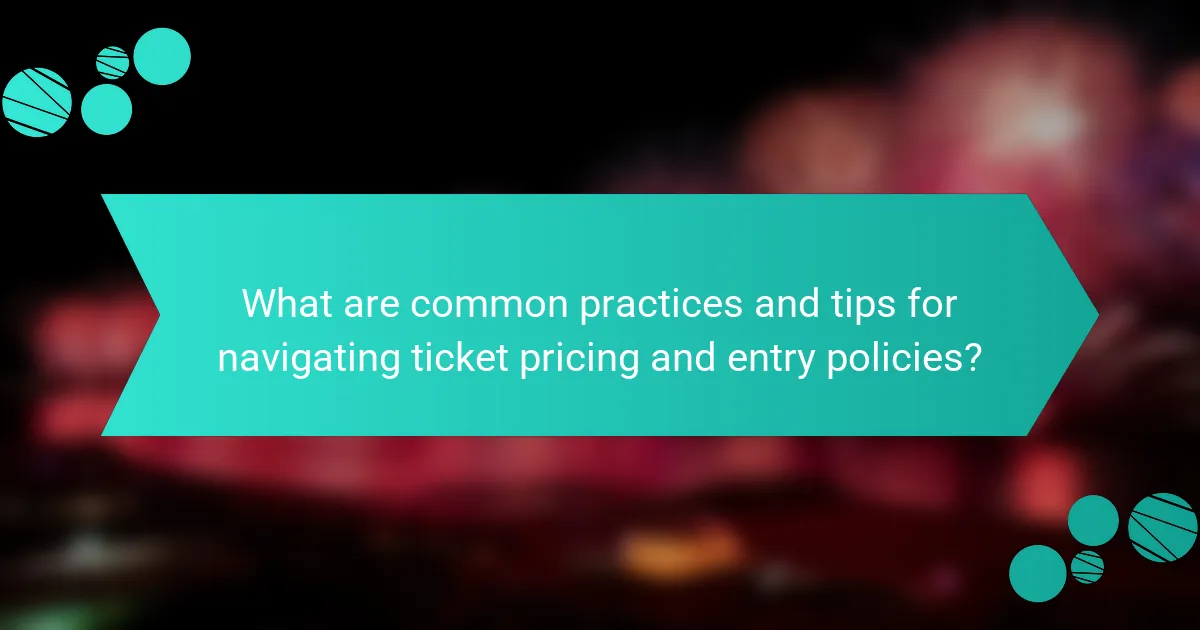Ticket pricing in French nightclubs typically ranges from €10 to €30, influenced by factors such as event type, day of the week, and venue popularity. Entry policies generally require patrons to be at least 18 years old, with ID verification and potential dress code restrictions in place. Economic conditions, competition, and local regulations significantly affect pricing strategies and accessibility. Common practices for navigating these policies include researching venues, taking advantage of early bird tickets, and understanding specific entry requirements. Overall, these elements contribute to shaping the nightclub experience in France.

What are Ticket Pricing and Entry Policies in French Nightclubs?
Ticket pricing in French nightclubs typically ranges from €10 to €30. Prices may vary based on the event, day of the week, and the popularity of the venue. Entry policies often require patrons to be at least 18 years old. ID verification is standard at the entrance. Some clubs implement a dress code, which can restrict casual attire. Reservations for tables may incur additional fees. Special events can lead to higher ticket prices. Discounts may be available for early bookings or guest lists. Overall, policies aim to create an exclusive atmosphere while ensuring safety.
How do ticket pricing strategies vary across different French nightclubs?
Ticket pricing strategies vary widely among different French nightclubs. High-end clubs often implement premium pricing, reflecting their luxury ambiance and exclusive events. These venues may charge entry fees ranging from €20 to €100, especially during special occasions. Mid-range nightclubs typically adopt competitive pricing, with fees between €10 and €30, aiming to attract a broader audience. Budget-friendly clubs may offer free entry or minimal fees, encouraging higher foot traffic and bar sales. Seasonal events and guest DJs can also influence pricing, leading to fluctuations. Additionally, some clubs offer discounts for early arrivals or group bookings, enhancing accessibility. Overall, the variation in ticket pricing reflects the target demographics and market positioning of each nightclub.
What factors influence ticket prices in French nightclubs?
Ticket prices in French nightclubs are influenced by several factors. Demand for the event significantly impacts pricing. Popular DJs or performers can drive up ticket costs. The venue’s location also plays a critical role; clubs in major cities typically charge more. Special events or themed nights often lead to higher prices. Additionally, the day of the week affects pricing; weekends usually see increased ticket rates. The club’s reputation can influence prices as well; well-known venues may charge a premium. Seasonal trends, such as summer festivals, can also lead to price fluctuations. Finally, age restrictions and VIP packages may create varied pricing structures.
How do peak times affect ticket pricing?
Peak times significantly increase ticket pricing in French nightclubs. This pricing strategy is based on demand fluctuations. During weekends and holidays, more patrons seek entry. Nightclubs respond by raising prices to maximize revenue. For instance, studies show that ticket prices can rise by 20% to 50% during peak hours. This approach capitalizes on higher customer willingness to pay. Additionally, early bird discounts may be offered for non-peak times. This incentivizes attendance during less busy periods. Overall, peak times create a dynamic pricing environment in the nightclub industry.
What entry policies are commonly implemented in French nightclubs?
French nightclubs commonly implement entry policies that include age restrictions, dress codes, and guest lists. Most clubs require patrons to be at least 18 years old to enter. This age restriction aligns with legal drinking laws in France. Dress codes often mandate stylish or upscale attire to maintain a certain ambiance. Many clubs also use guest lists to control capacity and ensure a selective entry process. Some venues may charge cover fees that vary based on the night or event. ID checks are routinely conducted to verify age and identity. These policies help maintain a safe and enjoyable environment for all guests.
What age restrictions are typically enforced at French nightclubs?
French nightclubs typically enforce an age restriction of 18 years old for entry. This legal age aligns with the country’s drinking laws. Individuals under 18 are not permitted to enter nightclubs. Some venues may have additional policies regarding specific events or nights. These policies can vary by location and management. However, the standard minimum age remains consistent across most establishments. This regulation helps ensure compliance with alcohol consumption laws.
How do dress codes impact entry policies?
Dress codes significantly influence entry policies in French nightclubs. They establish expectations for attire and can determine who is allowed entry. Clubs often enforce dress codes to maintain a certain atmosphere or brand image. For instance, upscale venues may require formal wear, while casual spots might allow relaxed attire. Non-compliance with the dress code can result in denied entry. This practice is common in the nightlife industry to curate a specific clientele. Research indicates that dress codes can enhance a club’s exclusivity, attracting patrons willing to adhere to standards. Hence, dress codes serve as a tool for clubs to manage their environment and customer experience.
What are the differences between online and on-site ticket purchases?
Online ticket purchases allow customers to buy tickets through websites or apps. This method provides convenience and access to a wider range of events. Customers can compare prices and options easily. Additionally, online purchases often come with early bird discounts. On-site ticket purchases require customers to buy tickets at the venue. This method may result in limited availability, especially for popular events. On-site purchases can also incur higher prices due to demand. Overall, online purchases offer convenience and potential savings, while on-site purchases may provide immediate access but with potential drawbacks.
How does the pricing differ for online tickets versus at-the-door tickets?
Online tickets are generally cheaper than at-the-door tickets. Online ticket prices can be 10% to 30% lower than door prices. This price difference incentivizes advance purchases. At-the-door tickets often incur additional fees or higher demand pricing. Many nightclubs offer limited availability for online tickets, creating urgency. Discounts for online purchases are common to boost sales. This pricing strategy is supported by industry trends showing increased online ticket sales.
What convenience factors are associated with online ticket purchases?
Online ticket purchases offer several convenience factors. They provide instant access to tickets without the need to visit a physical location. Users can compare prices and availability across multiple platforms quickly. Online transactions allow for flexible payment options, including credit cards and digital wallets. Customers can purchase tickets anytime, eliminating time constraints associated with traditional sales. Additionally, online purchases often include mobile ticketing options, reducing the need for printed tickets. This convenience has led to increased consumer satisfaction and higher ticket sales for events.

How do external factors affect ticket pricing and entry policies?
External factors significantly influence ticket pricing and entry policies in French nightclubs. Economic conditions, such as inflation or local unemployment rates, can lead to price adjustments. For example, higher disposable income in a region may result in increased ticket prices. Conversely, economic downturns might force clubs to lower prices to attract patrons.
Competition among nightclubs also affects pricing strategies. Clubs may offer promotional deals or discounts to draw in customers when faced with nearby rivals. Seasonal events, such as holidays or festivals, can cause temporary spikes in ticket prices due to increased demand.
Local regulations and laws play a crucial role in entry policies. For instance, age restrictions and capacity limits mandated by authorities can dictate how clubs manage entry. Additionally, safety concerns, such as health regulations during pandemics, can alter entry requirements and pricing structures.
These external factors collectively shape the operational strategies of nightclubs, impacting both affordability and accessibility for patrons.
What role does location play in determining ticket prices?
Location significantly influences ticket prices for events in French nightclubs. Urban areas typically have higher demand, leading to increased prices. Cities like Paris or Marseille see premium pricing due to higher costs of living. Conversely, rural locations often have lower ticket prices due to reduced demand. Proximity to popular attractions or nightlife hotspots can also elevate prices. Additionally, local competition affects pricing strategies. Nightclubs in high-traffic areas may charge more to capitalize on foot traffic. Historical data shows that events in major cities consistently sell tickets at higher rates compared to smaller towns.
How do neighborhood demographics influence pricing strategies?
Neighborhood demographics significantly influence pricing strategies in French nightclubs. Factors such as income levels, age distribution, and cultural backgrounds affect how clubs set their prices. Higher-income neighborhoods may allow for premium pricing due to greater disposable income. Conversely, clubs in lower-income areas might adopt competitive pricing to attract more patrons.
Age demographics also play a crucial role. Clubs targeting younger audiences may implement lower entry fees to encourage higher foot traffic. In contrast, venues appealing to an older demographic may charge more, reflecting different spending habits. Cultural preferences in neighborhoods can dictate the types of events hosted, which in turn influences pricing.
Research indicates that clubs adapt their pricing strategies based on local competition and demographic analysis. For instance, a study by the Journal of Hospitality and Tourism Research highlighted that understanding local demographics can lead to increased profitability through tailored pricing strategies.
What impact does competition have on ticket pricing?
Competition significantly influences ticket pricing in French nightclubs. When multiple venues offer similar experiences, they often adjust their prices to attract customers. This results in a dynamic pricing environment where clubs may lower prices to remain competitive. For instance, during peak times, clubs may offer discounts or promotions. This strategy aims to draw patrons away from competing establishments. Additionally, competition encourages clubs to enhance their offerings, such as better entertainment or exclusive events, justifying higher prices. Research indicates that in markets with high competition, prices tend to stabilize at lower levels. This price sensitivity is crucial for maintaining customer interest and maximizing attendance.
How do special events influence entry policies and pricing?
Special events significantly influence entry policies and pricing in French nightclubs. These events often lead to increased demand for entry, resulting in higher ticket prices. For instance, during holidays or performances by popular DJs, clubs may implement stricter entry policies such as guest lists or VIP access. This can limit the number of attendees, creating exclusivity and driving up prices further. Historical data shows that ticket prices can increase by 30% or more during major events compared to regular nights. Additionally, clubs may offer early bird pricing or tiered pricing strategies to manage demand effectively. This pricing strategy ensures that early buyers benefit while also maximizing revenue from late purchasers.
What are the price variations for themed nights or guest DJ events?
Price variations for themed nights or guest DJ events in French nightclubs typically range from €10 to €50. Basic entry for regular nights usually costs around €10 to €20. Special themed nights or guest DJ performances often increase the price to €30 or more. High-demand events featuring popular DJs can reach up to €50 or higher. Prices may also vary based on the venue’s location and reputation. Early bird tickets often offer discounts, while VIP packages can significantly increase costs. These variations reflect the exclusivity and popularity of the events.
How do holidays and festivals affect ticket pricing and entry rules?
Holidays and festivals significantly influence ticket pricing and entry rules in French nightclubs. During peak holiday periods, such as New Year’s Eve or Bastille Day, ticket prices often increase. This price surge is due to higher demand for entertainment options during these festive times. Additionally, nightclubs may implement stricter entry rules during holidays. For example, age restrictions may be enforced more rigorously to ensure compliance with local laws. Special events or themed parties may also require advance ticket purchases. This is to manage crowd sizes and enhance security measures. Overall, holiday and festival periods lead to both elevated pricing and modified entry policies in the nightclub scene.

What are common practices and tips for navigating ticket pricing and entry policies?
Common practices for navigating ticket pricing and entry policies include researching venues ahead of time. Many nightclubs offer early bird tickets at reduced prices. Checking official websites or social media pages can provide insights into upcoming events and pricing. Additionally, understanding entry policies such as age restrictions and dress codes is crucial. Some clubs may have specific nights with lower entry fees or promotions. Arriving early can also help avoid long lines and ensure entry. Loyalty programs or guest lists may offer discounts or free entry for frequent visitors.
What should patrons know before purchasing tickets for French nightclubs?
Patrons should know that ticket prices for French nightclubs vary significantly based on the venue and event. Many clubs offer early bird tickets at discounted rates. Prices may increase closer to the event date or on the night itself. Some clubs have a cover charge that includes a drink, while others charge separately for entry and drinks. Patrons should also be aware of age restrictions, as many nightclubs require patrons to be at least 18 or 21 years old. Additionally, dress codes may apply, and failure to adhere can result in denied entry. It is advisable to check the club’s website for specific policies and ticket availability before purchasing.
How can patrons find the best ticket deals and discounts?
Patrons can find the best ticket deals and discounts by utilizing various online platforms. Websites like Ticketmaster and Eventbrite frequently offer promotional codes and early-bird pricing. Additionally, subscribing to newsletters from venues and promoters can provide exclusive offers. Social media channels also often feature flash sales and giveaways. Joining loyalty programs may grant access to discounted tickets as well. Lastly, comparing prices across multiple sites ensures patrons secure the best deal available.
What are the best practices for adhering to entry policies?
Best practices for adhering to entry policies include understanding the specific requirements of the venue. Patrons should familiarize themselves with dress codes and age restrictions. Arriving early can help avoid long lines and ensure compliance with entry limits. Carry valid identification to verify age and identity. Following the venue’s rules regarding behavior is crucial for maintaining entry privileges. Being respectful to staff can facilitate a smoother entry process. Adherence to these practices enhances the overall nightclub experience and ensures compliance with regulations.
What are the key takeaways for enjoying nightlife in French nightclubs?
To enjoy nightlife in French nightclubs, arrive early to avoid long lines. Many clubs have entry fees that vary by night and event. Dress codes are often enforced, so stylish attire is recommended. Understand that some clubs may have age restrictions, typically requiring patrons to be at least 18 years old. Reservations for tables can enhance the experience and provide better seating options. Popular clubs can get crowded, so expect a lively atmosphere. Be prepared for late-night hours, as many venues open until dawn. Finally, familiarize yourself with the local customs regarding tipping and service.
How can understanding ticket pricing enhance the nightclub experience?
Understanding ticket pricing enhances the nightclub experience by allowing patrons to make informed decisions. Knowledge of pricing structures helps individuals budget their night out effectively. This understanding can lead to selecting the best time for entry, maximizing value. For example, early bird tickets often cost less than last-minute purchases.
Additionally, awareness of special promotions can provide access to exclusive events. Some clubs offer reduced prices for group bookings, enhancing the social experience. Understanding these dynamics can also reduce stress related to unexpected costs. Research indicates that patrons who anticipate expenses enjoy their experience more fully.
In conclusion, grasping ticket pricing intricacies directly contributes to a more enjoyable and financially manageable nightclub visit.
What strategies can help ensure smooth entry into nightclubs?
Arriving early is a key strategy for smooth entry into nightclubs. This allows patrons to avoid long lines and crowded entrances. Checking the club’s dress code is essential to meet entry requirements. Many clubs enforce strict dress policies, which can lead to denied entry. Purchasing tickets in advance can also facilitate quicker access. Some clubs offer skip-the-line options for ticket holders. Understanding peak hours can help patrons choose the best times to arrive. Researching specific club entry policies can prevent surprises at the door. Lastly, maintaining a respectful demeanor with staff can enhance the likelihood of a smooth entry experience.
The main entity of this article is ticket pricing and entry policies in French nightclubs. The article provides a detailed overview of ticket pricing structures, which typically range from €10 to €100 depending on factors such as event type, venue popularity, and day of the week. It outlines common entry policies, including age restrictions, dress codes, and ID verification, while also discussing how external factors like location and competition influence pricing strategies. Additionally, the article highlights the differences between online and on-site ticket purchases, as well as best practices for patrons to navigate these policies effectively.